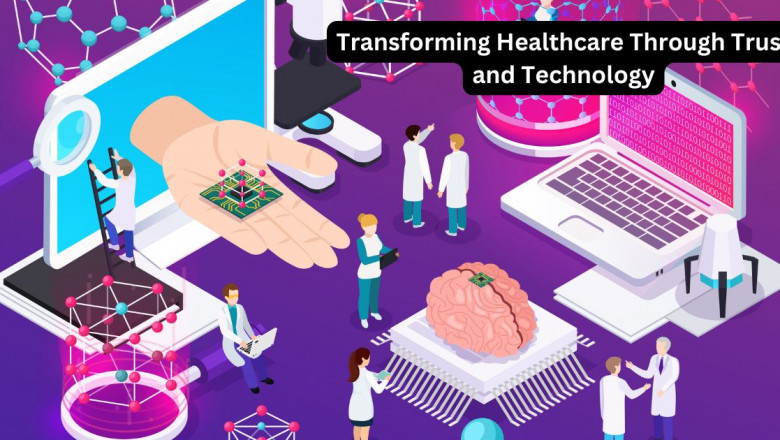views
Blockchain technology has been hailed as a revolutionary solution for industries ranging from finance to supply chain management. In healthcare, the promise is equally compelling—enhanced security, greater transparency, and improved efficiency in managing patient data and operations. However, while the potential is undeniable, navigating the real-world applications of blockchain in healthcare reveals a blend of opportunities and challenges.
In this blog, we’ll dive into the realities of blockchain in healthcare, examining where the technology delivers, where it falls short, and how businesses can leverage it effectively.
What Makes Blockchain Relevant to Healthcare?
At its core, blockchain is a decentralized, immutable ledger that ensures secure data storage and transparent transactions. These features align perfectly with some of healthcare’s biggest challenges:
-
Data Security: Protect sensitive patient information from breaches.
-
Interoperability: Enable seamless sharing of data across healthcare providers.
-
Transparency: Reduce fraud in clinical trials, billing, and drug supply chains.
-
Efficiency: Automate processes like claims settlement and patient consent through smart contracts.
Blockchain Use Cases in Healthcare: Real-World Applications
1. Securing Electronic Health Records (EHRs)
Patient data breaches have been a persistent issue in healthcare, with centralized systems offering lucrative targets for hackers. Blockchain provides a secure, decentralized solution for managing EHRs.
How It Works:
-
Patient data is encrypted and stored on a blockchain ledger.
-
Access is controlled through private keys held by the patient and authorized healthcare providers.
Example:
Projects like Medicalchain use blockchain to create tamper-proof health records, enabling secure sharing between providers and patients.
2. Drug Supply Chain Transparency
Counterfeit drugs are a global problem, costing the industry billions and endangering lives. Blockchain enables end-to-end tracking of pharmaceuticals, ensuring authenticity and compliance.
How It Works:
-
Every transaction in the supply chain, from manufacturing to delivery, is recorded on the blockchain.
-
Stakeholders can verify the source and authenticity of medicines using blockchain data.
Example:
MediLedger, a blockchain platform, helps pharmaceutical companies meet regulatory requirements by providing real-time visibility into the drug supply chain.
3. Streamlining Health Insurance and Claims
The inefficiencies and fraud prevalent in health insurance processes can be addressed using blockchain technology.
How It Works:
-
Smart contracts automatically validate insurance claims based on predefined rules.
-
Blockchain records ensure transparency and reduce disputes.
Example:
Solve.Care leverages blockchain to automate claims settlement and provide real-time transparency into insurance processes.
4. Enhancing Clinical Trials
Clinical trials are often plagued by data tampering and inefficiencies. Blockchain ensures that trial data is secure, transparent, and compliant with regulations.
How It Works:
-
Trial data is logged on the blockchain, making it immutable and verifiable.
-
Smart contracts automate participant reimbursements and milestone tracking.
Example:
Blockchain solutions like ClinTex enhance collaboration and data integrity in clinical trials, improving outcomes for researchers and patients.
5. Enabling Secure Telemedicine
With the rise of telemedicine, ensuring the security of patient-doctor interactions is critical. Blockchain adds a layer of security and trust.
How It Works:
-
Blockchain encrypts telemedicine data, ensuring privacy and preventing unauthorized access.
-
Patients can manage their medical records and share them securely with providers.
Example:
Platforms like Doc.ai integrate blockchain to enhance the security and efficiency of telemedicine services.
Challenges of Blockchain in Healthcare
While blockchain offers significant advantages, its adoption in healthcare comes with challenges:
1. Scalability
Blockchain networks can struggle to handle the high transaction volumes required for real-time healthcare data.
2. Regulatory Uncertainty
Healthcare is a highly regulated industry, and integrating blockchain requires compliance with frameworks like HIPAA and GDPR.
3. Integration with Legacy Systems
Most healthcare organizations still rely on centralized legacy systems. Transitioning to blockchain requires significant time and resources.
4. Cost
The initial implementation of blockchain solutions can be expensive, making it a barrier for smaller organizations.
How Blockchain Development Services Drive Adoption in Healthcare
The complexities of blockchain technology demand expertise to ensure seamless implementation. Partnering with experienced blockchain development services helps healthcare organizations overcome challenges and maximize blockchain’s potential.
Key Offerings:
-
Custom Solutions: Tailored platforms for EHR management, supply chains, and more.
-
Smart Contract Development: Automating processes like claims settlement and consent management.
-
Compliance Tools: Ensuring blockchain solutions adhere to healthcare regulations.
-
Interoperability: Building platforms that integrate seamlessly with existing systems.
Future of Blockchain in Healthcare
The hype around blockchain in healthcare is evolving into tangible results, with several promising trends on the horizon:
-
AI and Blockchain Integration: Combining artificial intelligence with blockchain for predictive analytics and personalized care.
-
Global Health Records: Developing interoperable blockchain networks for global patient data sharing.
-
Decentralized Clinical Research: Blockchain-powered platforms enabling collaborative research across borders.
-
Tokenized Health Incentives: Rewarding patients for maintaining healthy lifestyles with blockchain-based tokens.
Conclusion
Blockchain technology holds immense promise for revolutionizing healthcare by addressing critical issues like data security, transparency, and efficiency. However, moving beyond the hype requires careful planning, the right expertise, and a commitment to overcoming challenges like scalability and regulatory compliance.
With the support of professional blockchain development services, healthcare organizations can build secure, scalable, and compliant solutions that transform patient care and operations. As the industry continues to evolve, blockchain will undoubtedly play a key role in shaping the future of healthcare.
Blockchain in healthcare isn’t just a buzzword—it’s a real solution poised to deliver meaningful change. Are you ready to embrace it?






















Comments
0 comment